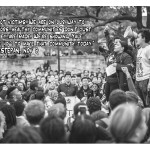Community is just as much identity as faith, labor, and empathy, and the recognition that these pieces are inextricably connected is terrifying. When we draw from our past experiences, we are able to see a pathway towards change for all of us. That includes loving and loving fiercely, and loving not just in times of great trauma or grief. It is finding the time to have a conversation with someone in our communities about their politics. It is loving enough to tell your parents when they are being racist or transphobic or just downright rude. It is knowing that all of our struggles are intertwined and rooting your investment in our collective development. When you love something, you care about its growth and success. Critique is a form of love, and POC love is a beautiful thing.
Everything seems so immediate at times, and that is frightening. As a result, a lot of us have been taught to be frugal with our love as a form of self-preservation. This lesson is well learned; disappointment after heartbreak after broken promise refocuses our principles even narrower. This anger is a visceral reaction that is necessary in the face of that which threatens us or we perceive to threaten us. It is valid. We have compromised so much in the face of dissonance and striking opposition we operate by shrinking our systems further and further. But beneath that initial response lies an even deeper, perhaps hidden desire to better our collective situation, and that is a vibrant form of love that needs to be tapped into.
As we continue our work within activist circles and advocate for the radical change of oppressive systems, there tends to be a focus towards confining our energy towards like-minded people. I say this not as a repudiation of community but as a posit for broadening our definitions of such. In compartmentalizing, we forget where we come from. Many of us were- myself included- mad problematic in the past. Despite this background, we actively participate in the rapid dismissal of those who aren’t on the same “woke” plane as us. When I say this I mean people who are still in the nascent stages of affirming social justice principles: baby feminism, naivety about capitalism, white apologists and the like. Oftentimes these people are younger than us. But when they are our age or older, that’s when things really get contentious. Arundhati Roy’s theory of “the narcissism of small difference” comes to mind in thinking about this manifestation of emotions.
But in perpetuating further fragmentation we also witness our own failings: how quick we are to body-shame when we dislike someone, the respectability politics that falls out of our mouths from time to time, the half-truths that we spread when we are hurt and jaded and feel as though there is no more room for sympathy. It’s a double-edged sword.
Let it be made clear that I am not an apologist. I don’t owe anyone anything, and my people don’t owe anyone anything, and it is not the job of the oppressed to educate the oppressor. That being said, I grew into this mentality through a lot of labor, self-reflection and critique from my counterparts (and a shit ton of reading). The point isn’t that I’m here now. The point was the journey here.
I say without reservation that the only way I got to where I am now was through other women of color’s patience with me. My potential was viewed as something worth struggling for. Thus, my growth towards understanding the insidious workings of systemic oppression has been painful at times and has strained my relationships to the point of breaking. It’s ugly, but we make things work; it is an act of love and and an act of resilience.
I’m not saying it is our job to fix everyone who says something problematic. Some people you just have to let go. But if you love someone enough, making the extra effort to extend guidance and criticism towards them can be all the difference.
And to all the baby activists out there, when someone loves you enough to call you out on your bullshit, stop. Listen. Appreciate. Love is a two-way street.


